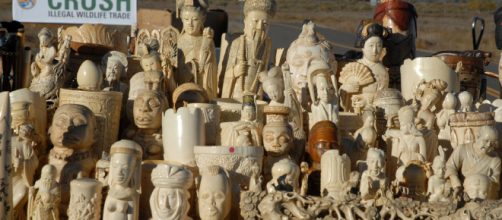75-year-old American investigator Esmond Bradley Martin dedicated much of his life to fighting the illegal ivory trade. That life ended tragically on Sunday when a family member found Martin's corpse inside of his home in Nairobi, Kenya. Police investigators discovered that Martin had died from a stab wound to his neck. At the time of his murder, Martin had just returned from a fact-finding mission in Myanmar. According to a report from the BBC, Martin was in the process of writing down his findings from his most recent trip when he was killed.
Martin is best known for going undercover in order to investigate the illegal world of black market ivory.
Four years ago, The Week found that poachers in Africa were killing elephants at a rate of 35,000 a year. Back then, a single elephant tusk (the main source of ivory) had a sticker price of $1,500. These days, not as many African elephants are being poached because the price of ivory in China, formerly the world's largest importer of illegal ivory, has dropped.
As a former special envoy on rhino conservation for the UN, Martin played a role in enlightening the world about the true scope of the illegal trade in ivory. Martin first traveled to Kenya in the 1970s in order to report on the growing market for ivory, and until his death Martin risked his life in order to document the sale of illegal ivory in China, Vietnam, Laos, and other Asian and African nations.
Often times Martin acquired this access by simply posing as a prospective buyer.
Murder mystery
Nicolas Kamwende, the head of Nairobi's criminal investigation department, was the first to publicly report Martin's death. At this point, Kenyan police are investigating the murder as a possible case of "robbery gone wrong." No suspects have been named yet.
According the United States Department of State, home invasions and burglaries account for some of the more common forms of violent Crime In Kenya. Although much more peaceful and orderly than many of its neighbors, Kenya still has a high crime rate. Nairobi, the nation's capital and its largest city, is responsible for the majority of violent crime in Kenya.
In the wake of Martin's death, many of his former peers and friends have come forward to remember his memory with kind words. Nic Hailey, the British High Commissioner to Kenya, wrote in a Twitter post: "A passionate and committed man who made a big difference to our planet. May he rest in peace." Robert Godec, the American Ambassador to Kenya, likewise remembered Martin as "a true giant of conservation and a champion for African elephants and rhinos." Conservationist Dr. Paula Kahumbu posted on her personal Twitter account that "Esmond was at the forefront of exposing the scale of ivory markets in the USA, Congo, Nigeria, Angola, China, Hong Kong, Vietnam, Laos, and most recently Myanmar."
A dedicated life
Martin was born in 1941 in New York City.
A geographer by education and training, Martin began dedicating his life to stopping the ivory trade wherever he found it in the 1970s. Martin's work helped to stop the trade of endangered rhino horns between East Africa and China. However, despite all of Martin's great work, the ivory trade continues to threaten certain species all across Africa. Because of poaching, there are only approximately 400,000 elephants left in the world today. The remains of some of these poached elephants were recently seized in January when Thai police found 326 pounds of African elephant ivory at Bangkok's international airport.


